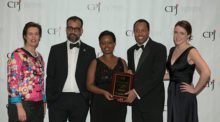MUNK SCHOOL GRAD FIGHTS FOR PRESS FREEDOMS

ALEX GILLIS
Master of Global Affairs (MGA) alumna Kerry Paterson (MGA’14) loves her new job, in spite of the horrors. This year, she began working in New York City as the Global Advocacy and Communications Manager with the U.S.-based Committee to Protect Journalists (CPJ), a non-profit organization that protects press freedom and saves journalists from imprisonment and murder.
Recently, she and her colleagues advocated for the release of Bheki Makhubu, an imprisoned journalist in Swaziland. He’d been in jail for articles he’d co-written about a disgraced high-court judge, and that same judge imprisoned him for 15 months, a situation that CPJ called “vindictive from the start.”
The hard work of Paterson and her colleagues saved him from more years in prison.
“I got to meet Makhubu in the CPJ office in New York,” she says. “The best part of my job is getting to meet journalists like him, some of the most incredible, courageous people, who, against all odds and unspeakable dangers, feel compelled to shine a light where no one pays attention.”
Paterson’s trajectory from the Munk School of Global Affairs to CPJ was fast. While completing an undergraduate degree in the Peace, Conflict and Justice program and an MGA, both at the Munk School, she worked closely with two Munk School professors, Anita McGahan and Ron Levi, on social justice issues and helped to organize a conference about sexualized violence against women in Libya and Syria.
“In that process, I met the director of the Women Under Siege Project, in New York, and that connection ended up becoming my MGA summer internship,” Paterson says. “She suggested that I look at CPJ. It’s a direct line from my experience at the Munk School to where I am now.”
“What I appreciate about the Munk School is that they’re supportive of whatever project you want to take on,” she explains. “There’s a lot of space to be self-directed and a lot of support to develop special-interest projects.”
Her work includes reporting on the abuses of journalists in Canada. “In the U.S., the U.K. and Canada, you have more concerns about surveillance and threats, and more journalists worried about digital safety than ever before,” she says. “We’ve done more research on Canada in the past year than we ever have.” In 2015, CPJ joined calls for Egypt to free imprisoned Canadian journalist Mohamed Fahmy, and, this year, it took up the causes of VICE News reporter Ben Makuch and freelance journalist Justin Brake, both of whom were charged by Canadian authorities.
“By every metric, press freedoms are under threat worldwide,” she adds. “There’s never been a more dangerous time to be a journalist.” Recent CPJ reports contain record numbers of journalists killed or imprisoned, with the last CPJ prison census, for 2016, setting a new record: 81 in Turkey, 38 in China, 25 in Egypt and 259 jailed worldwide, as of December 1, 2016.
In addition, tensions between journalists and the U.S. administration have increased. “The U.S. has traditionally been strong on press freedom, but having a U.S. president who’s willing to dismiss or undermine a free press, sends a dangerous message to the rest of the world, which ultimately makes our jobs – and journalists’ jobs – a lot harder.”
“What’s concerning is the backsliding of countries that were previously beacons of the world, such as Kenya and South Africa,” she says. “They used to be leaders on their continent, but now the situations are getting much worse.”
“It’s concerning that freedom of expression and freedom of the press seem to be globally in decline,” she adds.
But with Paterson and CPJ running global campaigns, engaging the United Nations, raising awareness about press freedoms, and challenging governments here and overseas, she’ll continue advocating for the release of imprisoned journalists worldwide.

